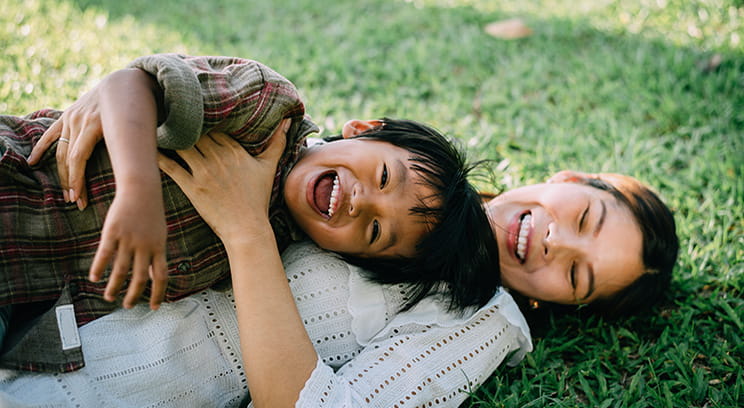Neurodiversity describes the differences in how our brains work and how we view the world. It highlights and celebrates the uniqueness of us all in how we think and behave.
There are lots of different types of neurodiversity. Some examples include autism spectrum disorder, attention deficit hyperactivity disorder (ADHD), dyslexia, dyspraxia, dyscalculia, and tic disorders.
People who are neurodivergent may think, feel, and behave differently to those who are neurotypical. By recognising and learning more about these differences it means we can better understand and support each other.
About one in every five-to-six children are thought to be neurodivergent.
In this article, we take a look at the importance of childhood diagnosis and supporting families of those with autism.
While signs and symptoms of neurodivergence are usually noticed in childhood, some people may not know they are neurodivergent until later in life.
One reason for this is that there can be a lot of variation in how symptoms present between people. There is no single, obvious sign that someone is neurodivergent.
This can make it harder for some people to understand, which can lead to many misconceptions about neurodivergence.
For instance, because signs of autism in girls are less obvious it can often be missed, while boys are four times as likely to be diagnosed.
Neurodivergent children may also behave in a way that people on the outside might have historically viewed as ‘naughty’.
It can be challenging for some neurodivergent children to be properly understood or supported. That’s why early and accurate diagnosis is key to ensuring they are able to receive the right support as they grow up, through to adulthood.
This often relies on descriptions of the child’s behaviour from parents or caregivers, as well as a professional’s observation.
Sometimes, a doctor or psychologist might refer the child to a specialist for further neurodevelopmental assessment.
Clinical diagnosis is, of course, only the first step a family must take in supporting neurodivergent children.
It often leads to as many new questions as answers, and finding the path to the right support can bring a lot of challenges.
Q&A: Navigating my son's diagnosis
Here, Dr Alex Robinson from Teladoc Health talks about his family’s journey from diagnosis to support and the impact it has had on their lives.
- What were the first signs you saw in your child which made you think they could be neurodivergent?
“It was very noticeable when my son first started nursery. He would have wild tantrums that were beyond anything I had seen before. I thought I knew about symptoms of neurodivergence from my patients, but experiencing it first-hand is a different story.”
- What was the first step you took in seeking a diagnosis?
“We initially took our son to child psychology sessions aimed at managing and controlling emotions. Unfortunately, these didn’t work. When it became clear we needed to do something, we paid for a private neurodiversity assessment.”
- What was the process like after this; did you find it challenging or did you feel supported?
“The neurodiversity assessment process was very good and felt very supportive. After this, however, it did feel that we were a little bit on our own. We have been incredibly fortunate that there is a local organisation that was set up by a parent and a psychologist to address this issue. So, there are people who [can support us].
We were offered support from my son’s school and our local authority. However, this is always with the expectation that his behaviour would rapidly improve. The education system doesn’t seem set up to provide encouragement or emotional help. Instead, they only viewed our child as a problem.”
- How did your child find this experience?
“I think he enjoyed the diagnostic process. Having an adult talk to him about his interests is something that he enjoys quite a lot. The professionals involved have known exactly how to speak to my son and make him feel listened to, and have made the experience positive.”
- Which condition(s) was your child found to have?
“He has autism, and after further assessment was found to have ADHD. His behaviour mostly presents as autism, but since being on medication for ADHD, he is better equipped to deal with school.”
- On a practical level, how has this neurodiversity diagnosis changed things for you and your child?
“As a family, I think there was a sense of relief. We had previously been given lots of advice on how we were ‘doing things wrong’, and it felt validating to have the diagnosis. It has been helpful when talking to other people and explaining my son’s difference.”
- On an emotional level, how have your family relationships developed post-diagnosis?
“We do find that a lot of our time is spent trying to keep my son calm. What has been heart-warming to see is how our five year-old daughter manages the situation. She has a good understanding of him. For all his challenging behaviour, she is probably the best friend he will ever have, and she accepts him for who he is.”
- What are your favourite things about your child and their unique personality, and what are your favourite things to do together?
“My son has a hyper-sensitivity to food. He likes eating toast with jam upside down, or going through the spice rack doing taste tests. We now spend a lot of time cooking, and I have learnt to trust some of the combinations he puts together, even if they ought not to work.
It is also really nice if we just go for a drive. It’s during these times that I really get to know him. Where there is no eye contact, no expectation of what we are going to talk about, no expectation of where we are going. Just letting him tell me about things from the game Minecraft, and letting the conversation end up in unexpected places.”
- What are some stereotypes and misconceptions about neurodivergent children that you wish people could see past?
“I often think about how neurodiverse conditions are a hidden difference, and because of this, many other people lack sympathy and understanding. It’s a shame that, especially for boys with ADHD, being enthusiastic or inquisitive is seen as naughtiness.
I would also expect more from professionals when it comes to children and neurodiversity. It became upsetting when people called our son’s outbursts deliberate and mischievous. The moments he became overwhelmed at school were a reaction to him not feeling safe, in the same way that another child may burst into tears.”
- Have there been specific situations where people’s assumptions have made things worse?
“My son often looks a little bit angry, and sometimes complete strangers will ask him why he looks so miserable. The assumption that he should look a certain way can be upsetting. Also, I don’t know whether this happens to boys all the time, but my son hates having his hair ruffled by adults that don’t know him. It can take ages for him to get over it.”
- What advice would you give to someone who thinks their child may be neurodivergent?
“Here’s my advice:
- Firstly, stop! Just put everything else on pause for a few days, or even a few weeks. Parenting is hard at the best of times, and the journey to diagnosis may be slow.
- Be calmly assertive with their school. Always think, ‘Is this best for my child?’ and don’t assume that because a school does something a certain way, it is the right way to support your child and their needs.
- Also be assertive with your employer. I wish that earlier on, I had negotiated flexible working hours, rather than trying to manage and support my son’s diagnosis around working full time.
- Ask friends and relatives for assistance, rather than advice. Get some help so you can have more time to spend with your child, or to give more attention to another child, or have some time to yourself.
- Find someone with whom you can share your frustrations and funny stories without judgement. Have a look for local charities or organisations that can offer practical advice and support, or other parents who are in a similar situation.
- Cast aside every idea you may have about how things will be. Be prepared to, and enjoy, making your own traditions. It doesn’t really matter what you do, as long as you and your child feel safe and happy.
- Remember, no one is to blame. Your child may have just ended up with a mix of genes which means that they don’t fit in the ways society says they should. Neurodivergent children struggle with the same things as other kids, they are just openly reacting rather than internalising it.”
- What do you think still needs to change in society’s attitudes towards, and understanding of, neurodiversity?
“I think a lot of the current issues around neurodiversity relate to the idea that a person only has value if they are economically productive. I hope more of society realises that neurodivergent people have a natural curiosity and creativity that can offer new and unexpected ideas.”




